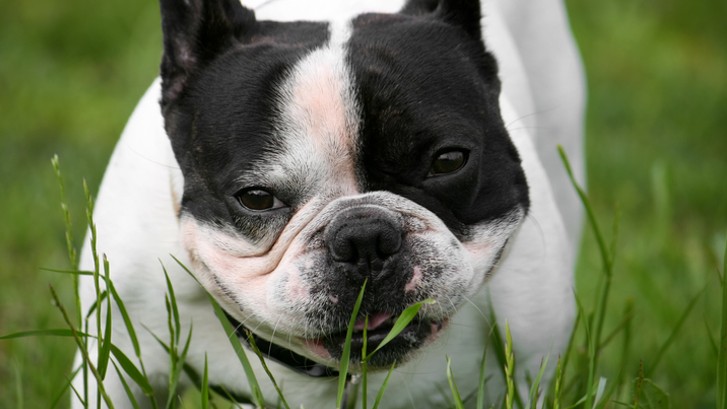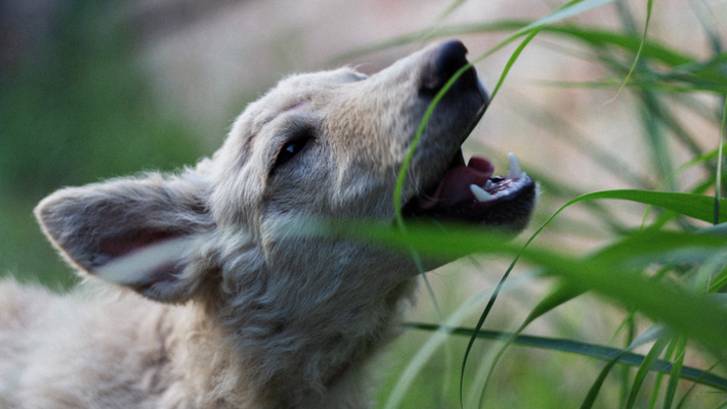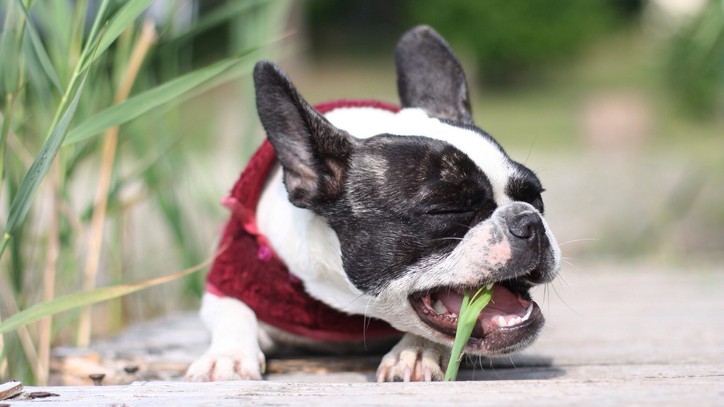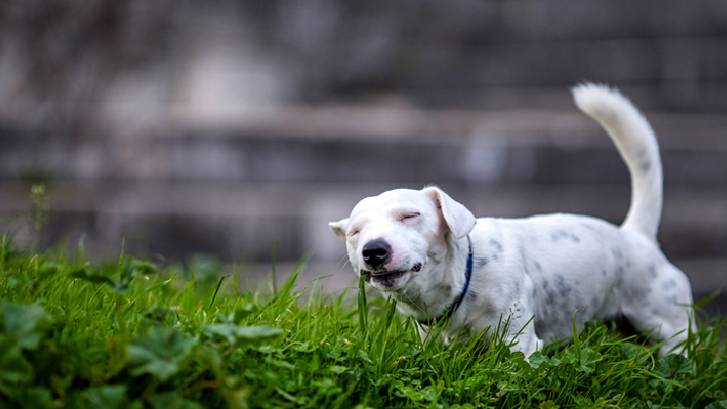Why do dogs eat grass? And should you stop them?
Why do dogs eat grass? It’s a mystery – but there are a few possible causes

Get the best advice, tips and top tech for your beloved Pets
You are now subscribed
Your newsletter sign-up was successful
Have you caught your pooch nibbling on the lawn? Many pet owners wonder why dogs eat grass after spotting their canine companion eagerly chewing on a patch of greenery, or become concerned about this behavior once their dog has vomited up the strands following a trip outdoors.
However, eating grass is a common canine behavior, albeit one that leaves many pet owners puzzled. Interestingly, we don’t know exactly why some dogs choose to eat grass and others don’t – and our dogs can’t speak up to give us any insight. However, vets and veterinary behaviorists do have some theories on what makes your dog decide to start grazing.
To help get to the bottom of your dog’s vegetarian habit, consider these common reasons why dogs eat grass.
Why do dogs eat grass?
1. To help settle nausea
Many pet owners have heard that a dog will eat grass to soothe an upset tummy – and this may in fact be true. Many dogs will seek out grass, dirt, or other non-food objects when they are nauseous. Vets have hypothesized that the grass may help settle the stomach, or may simply encourage vomiting to get the offending material out.
If your dog is eating grass due to an upset stomach, you may notice other symptoms of nausea such as drooling, lip licking, exaggerated swallowing, not eating, or vomiting. If your dog exhibits these symptoms, it’s important to see your vet for further evaluation.
Although nausea can sometimes occur due to simple gastroenteritis (or inflammation of the GI tract) or from dietary indiscretion, other causes of nausea can be much more serious, so it’s important to have the problem evaluated and treated.

2. Digestive issues
Maybe your dog isn’t exhibiting all the symptoms of nausea, but that doesn’t completely rule out a digestive problem. Some dogs may choose to start eating grass if they are experiencing issues such as intestinal parasites, enteropathy, gastritis, gastroesophageal reflux (also known as GERD or heartburn), or other conditions affecting the stomach and intestines.
Get the best advice, tips and top tech for your beloved Pets
However, it is important to remember that eating grass is not always a symptom of an underlying problem. In some cases, dogs just eat grass because they like it. But if your dog exhibits other signs of gastrointestinal disease, such as changes in appetite, nausea, vomiting, changes in stool quality, or abdominal pain, it’s definitely time to see your vet for an examination.
Many pet owners worry that eating grass or dirt is a sign of a dietary deficiency but, fortunately, this is usually not the case. Studies have shown that eating grass and dirt rarely correlates to any kind of nutrient deficiency or excess. If your dog is eating the best dog food that is age-appropriate and also complete and balanced, then it is highly unlikely that his diet is contributing to his love of grass.
If you are concerned that your dog’s diet may be inadequate, you can learn more about how to choose an appropriate dog food or consult your vet – they are your best resource to recommend a dog food that will be a good fit for your dog’s individual needs.

3. As attention-seeking behavior
Sometimes when our dogs perform weird, gross, or unusual behaviors, we inadvertently reinforce the behavior by making a big deal out of it. When your dog eats grass and you react – whether that reaction is scolding, surprise, concern, or simply trying to distract him away – he learns that eating grass is something exciting and a good way to get you to pay attention to him.
Attention-seeking behaviors are especially common in puppies. They also tend to explore the world through their mouths – another reason why your pup may find it fun and interesting to eat grass.
Eating grass is not inherently harmful unless your dog is eating a lot of it. So the best way to deal with eating grass as an attention-seeking behavior is to simply ignore it. If you don’t make a big deal out of the problem, your dog will soon learn that this is not an effective way to get your attention. If necessary, you can also gently lead your dog away from the area to discourage grass-eating – just be sure to stay calm and avoid too much interaction with your dog while you do it.
4. Maybe it just tastes good
Eating grass is just a normal behavior for some dogs and it isn’t necessarily harmful. We don’t know exactly why they do it – maybe it is an instinctual behavior or maybe it just tastes good!
Although grass eating can sometimes lead to vomiting, diarrhea, or blades of undigested grass in the stool, this usually isn’t anything to worry about as long as it only happens occasionally. Just make sure your dog does not eat grass from areas treated with fertilizers or pesticides and keep an eye out for any poisonous plants that could cause more serious health problems.
If your dog’s grass eating is more frequent or is accompanied by other changes in health or behavior, consult your vet to find out whether an underlying medical condition could be contributing to the issue.
Should you stop a dog from eating grass?
In general, it’s not necessary to stop your dog from eating grass as long as he’s only eating small amounts. Eating a small amount of grass may cause some temporary gastrointestinal upset, such as vomiting or diarrhea, but should not cause any serious harm to your pet.
However, you should stop your dog if he is eating large amounts of grass, and especially if he is eating other foreign objects such as rocks or sticks along with it. Large volumes of grass can cause a blockage in your dog’s digestive tract, which often requires expensive emergency surgery to fix.
If your dog’s grass eating behavior is new, it’s best not to ignore it. A trip to your ve may be necessary to find out what is causing this new behavior and to help get your dog feeling better if nausea or gastrointestinal disease are contributing to your dog’s sudden grass eating behavior.

What should I do if my dog eats grass?
If eating grass is a normal behavior for your dog or if it only happens occasionally, there’s likely no cause for alarm. As long as your dog is only eating small amounts of grass and is otherwise feeling well, you don’t need to stop your dog from eating grass. But if eating grass is a new behavior for your dog or is accompanied by other symptoms such as vomiting, diarrhea, lethargy, or loss of appetite, then it is best to see your vet for an examination.
Your vet will perform a full physical examination and may recommend some additional testing such as blood work or x-rays to rule out underlying illnesses that could cause your dog to eat grass. If a medical cause for your dog’s sudden grass eating behavior is found, your vet will also be able to prescribe appropriate treatment to help get your pup feeling better.
Why do dogs eat grass? It’s a mystery
The truth is, we still don’t know exactly why some dogs like to eat grass. Some dogs will eat grass their entire lives for no identifiable reason and without any ill effects. However, eating large volumes of grass or clods of dirt can lead to digestive problems for your dog, so it’s a good idea to keep a close eye on this behavior.
If your dog’s grass-eating behavior is new or worsening, or if it is accompanied by other changes in health and behavior, then it may be worthwhile visiting your vet to ensure there is no cause for concern.
Otherwise, your dog is free to continue his grazing behavior – and you’ll have less lawn mowing to do this summer.
You may also be interested in our expert’s advice on why your dog’s stomach is gurgling
Dr. Elizabeth Racine is a small animal general practice vet covering all things pet health and wellness. Her special interests include veterinary behavior, nutrition, and internal medicine.
As a freelance writer, Dr. Racine has written content for major companies in the industry such as the American Kennel Club, Merck Animal Health, Bayer PetBasics, Elanco, and CareCredit. In her free time, Dr. Racine enjoys playing trampoline dodgeball, hiking with her beagle Dasher, and spending time with her three mischievous cats.

